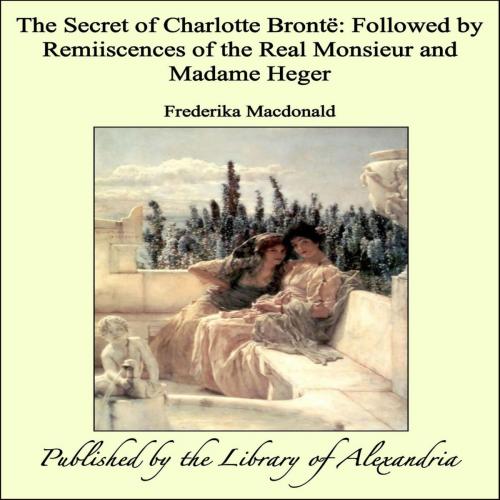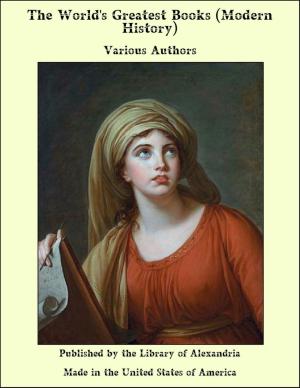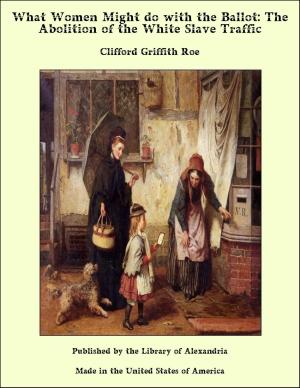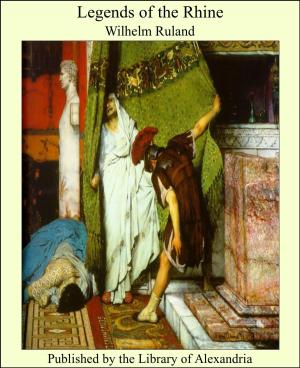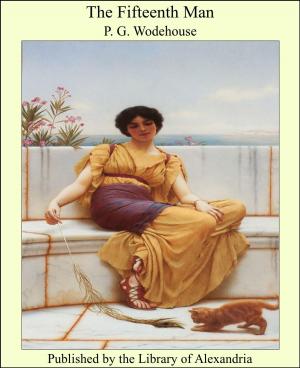The Secret of Charlotte Brontë: Followed by Remiiscences of the Real Monsieur and Madame Heger
Nonfiction, Religion & Spirituality, New Age, History, Fiction & Literature| Author: | Frederika Macdonald | ISBN: | 9781465561152 |
| Publisher: | Library of Alexandria | Publication: | July 29, 2009 |
| Imprint: | Library of Alexandria | Language: | English |
| Author: | Frederika Macdonald |
| ISBN: | 9781465561152 |
| Publisher: | Library of Alexandria |
| Publication: | July 29, 2009 |
| Imprint: | Library of Alexandria |
| Language: | English |
THE 'PSYCHOLOGICAL PROBLEM' OF CHARLOTTE BRONTË, CREATED BY A FALSE CRITICAL METHOD We live in an epoch when impressionist methods of criticism, admissible, and often illuminative, in the domains of art and of imaginative literature, have invaded the once jealously guarded paths of historical criticism, to the detriment of correct standards of judgment. Leading critics, whose literary accomplishments, powers of persuasive argument, and unquestionable good faith, lend great influence to their decisions, show no sort of hesitation in undertaking to interpret the characters and careers of famous men and women, independently of any examination of evidence, by purely psychological methods. I am not denying that, as literary exercises, some of these impressionist portraits of men and women of genius, seen through the temperament of writers who are, sometimes, endowed with genius themselves, are very interesting. But what has to be remembered (and what is constantly forgotten) is, that if these psychological interpretations of people who once really existed are to be accorded any authority as historical judgments, they must have been preceded by an attentive enquiry, enabling the future interpreter, before he begins to employ psychology, to feel perfectly certain that he has clearly in view the particular Soul he is undertaking to penetrate, with its own special qualities, and placed amongst, and acted upon by, the real circumstances of its earthly career. Where the preliminary precaution of this enquiry, into the true facts that have to be penetrated, and explained, has been neglected, no psychological subtlety, no pathological science, no sympathetic insight, can protect the most accomplished literary impressionist from forming, and fostering, false opinions about the historical personages he is judging from a standpoint of assumptions that do not allow him to exercise the true function of criticism, defined by Matthew Arnold as: 'an impartial endeavour to see the thing as in itself it really is.' In the case of Charlotte Brontë, her first, and, still, classical biographer, Mrs. Gaskell, carried through, now fifty-seven years ago, with great literary skill, and also with historical exactitude, the study of her parentage and youth; of her experiences in England as a governess; of her family trials and losses; of the sudden development of her talent, or rather, of her genius as a writer, that, at one bound, after the publication of her first novel, made her famous throughout England; and soon famous throughout Europe: and that proved her (since Charlotte has been 'dead'—as people use the phrase—more than half a century, and since her books are still living spirits, we may be allowed to affirm this) one of the immortals
THE 'PSYCHOLOGICAL PROBLEM' OF CHARLOTTE BRONTË, CREATED BY A FALSE CRITICAL METHOD We live in an epoch when impressionist methods of criticism, admissible, and often illuminative, in the domains of art and of imaginative literature, have invaded the once jealously guarded paths of historical criticism, to the detriment of correct standards of judgment. Leading critics, whose literary accomplishments, powers of persuasive argument, and unquestionable good faith, lend great influence to their decisions, show no sort of hesitation in undertaking to interpret the characters and careers of famous men and women, independently of any examination of evidence, by purely psychological methods. I am not denying that, as literary exercises, some of these impressionist portraits of men and women of genius, seen through the temperament of writers who are, sometimes, endowed with genius themselves, are very interesting. But what has to be remembered (and what is constantly forgotten) is, that if these psychological interpretations of people who once really existed are to be accorded any authority as historical judgments, they must have been preceded by an attentive enquiry, enabling the future interpreter, before he begins to employ psychology, to feel perfectly certain that he has clearly in view the particular Soul he is undertaking to penetrate, with its own special qualities, and placed amongst, and acted upon by, the real circumstances of its earthly career. Where the preliminary precaution of this enquiry, into the true facts that have to be penetrated, and explained, has been neglected, no psychological subtlety, no pathological science, no sympathetic insight, can protect the most accomplished literary impressionist from forming, and fostering, false opinions about the historical personages he is judging from a standpoint of assumptions that do not allow him to exercise the true function of criticism, defined by Matthew Arnold as: 'an impartial endeavour to see the thing as in itself it really is.' In the case of Charlotte Brontë, her first, and, still, classical biographer, Mrs. Gaskell, carried through, now fifty-seven years ago, with great literary skill, and also with historical exactitude, the study of her parentage and youth; of her experiences in England as a governess; of her family trials and losses; of the sudden development of her talent, or rather, of her genius as a writer, that, at one bound, after the publication of her first novel, made her famous throughout England; and soon famous throughout Europe: and that proved her (since Charlotte has been 'dead'—as people use the phrase—more than half a century, and since her books are still living spirits, we may be allowed to affirm this) one of the immortals
